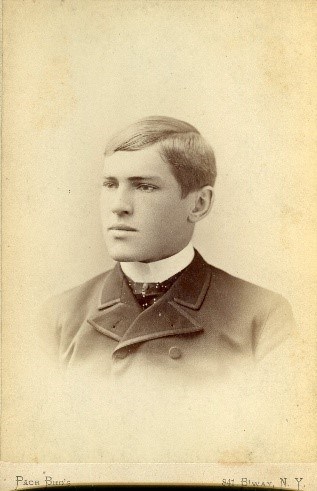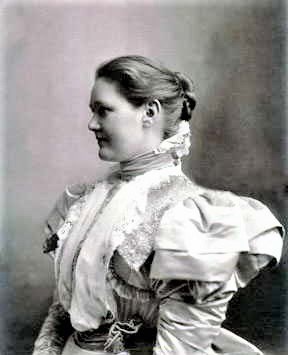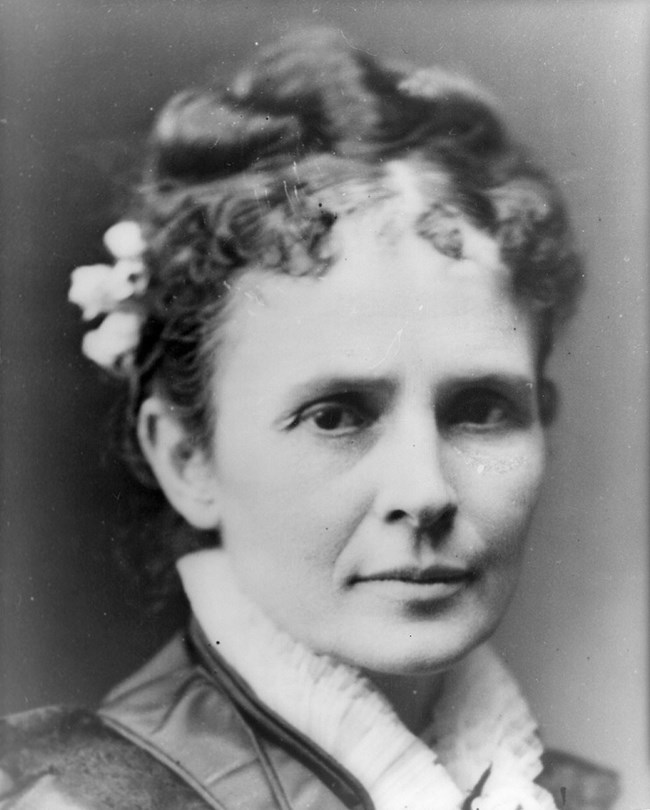Last updated: October 18, 2020
Article
James R. Garfield, Gentleman from Mentor (Part 2: A Young Man in Love)

NPS
The letters of James R. Garfield in 1889 and 1890 are the sketch of a young man in love – in love with his intended wife – and in love with the community in which he lived – in love with life and the many diversions it offered him.
Mentor, Ohio was home for James Rudolph Garfield from his fourteenth year to his eighty-fifth. In part one of this blog series you read of his dedication to the creation of free library system for Mentor. It was to be an improvement to the rural community he loved.
His letters to Helen are filled with admiration for the relaxed and verdant world around him. “Yesterday was a perfect Easter. I wish you could have been here to enjoy it,” he told the absent Helen. “This season in the country is delightful: it is nature’s childhood. Each day brings some new, beautiful revelation: the joyful songs of the birds tell us that the bondage of winter has been broken & that new life is beginning. Would men study nature more, and conform their lives to its laws there would be much more happiness.”

Similarly, on July 10, 1889 he recalled, “It was a lovely moonlight night and I sat on the porch strumming the same old tunes on my guitar. My friend the bright star peeped through the vines and reminded me of you…”
Garfield’s appreciation for the rural nature of his surroundings was reverently expressed later that year. “Yesterday in the country was lovely. After church… Uncle Jo and I wandered over our farm inspecting everything – and later the boys & I walked through the woods to Kirtland River, looking for chestnuts and enjoying the fine air. The colors in the woods are very brilliant this year.”
Nature enthralled him. So did his reading. He was much taken with the novels of William Makepeace Thackeray – The Newcomes, Pendennis, and Henry Esmond. He admired the noble characters penned by Thackeray, perhaps reminding him of his own father. He also attacked his father’s seven-volume biography of Alexander Hamilton, picking it up, putting it down and picking it up again, sporadically, throughout much of a year. Was reading about the consequential Hamilton a means of honoring his father’s memory and potential impact on the nation’s history?
In letters and diary entries written years earlier, James and Lucretia Garfield indicate that “Jimmie” might have been their “problem” child. He could be good as gold one moment and impossibly difficult the next. Letters from the adult James to Helen suggest that he continued to struggle with his moods. More than once he used the word “cranky” to describe himself.
Could it be that poor eyesight, combined with resulting headaches, was the cause of Jim’s moodiness? On June 19, 1889: he wrote, “My eyes are quite right again – no more headaches. I shall try to take better care of my glasses; they are a perfect nuisance.”

NPS
James was often playful with Helen, referring to her more than once in the third person. On June 19 he wrote her, “…I had only a few minutes and I wanted to tell you how often I think about somebody whom I want to see very soon.” An October 6 letter records, “The walk from the station roused me & I read of Clive & Ethel [characters in The Newcomes] till about one. I… finished only a few moments ago, sitting in the comfortable attic window seat which was large enough to offer a nice place for somebody whose lovely face would have made me very happy.” (That window seat is still in place.)
The winsome Garfield invited Miss Newell – and the unintended researcher/reader – to share his delight on October 12, 1889 when, “Just now a letter has come bearing a postmark and addressed in a handwriting which is very familiar and pleasant to see. Please excuse me while I read what is written by someone of whom I am quite fond…” He interrupted his writing to read. “And very good is such an interruption,” he concluded.
Almost a year before his marriage to Helen, James wrote, “Dearest little lassie… the months have not been many since we gave one another the best promises in the world, yet during them I have so much more fully understood the happiness in store for me that to wait very long before we can always be together seems very hard – no, not so ‘hard,’ that does not express the feeling – I do not think of the right word, but you know what I mean…”
He finished with a reflection on his mother’s strong influence on his life, his love for Helen, and a continuing need to be patient with life. “Sometimes I feel that I am a traitor to my Mother, who has made all that is good in me, by longing for someone else; but of course that is not true, and she, of all persons, would not think so. You have brought happiness to her as well as to me, and I am a surly fellow in being restless because I cannot have everything I wish right away.”
Written by Alan Gephardt, Park Ranger, James A. Garfield National Historic Site, September 2019 for the Garfield Observer.
